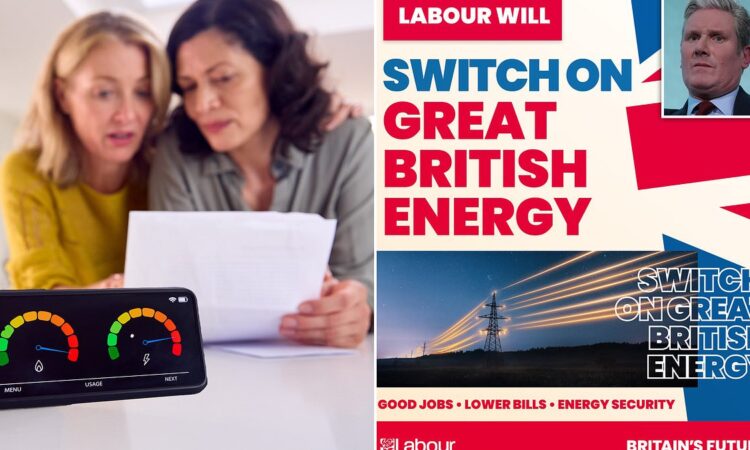
- Keir Starmer wants to bring in a national energy firm if Labour wins the election
- Great British Energy would fund green electricity projects and could cut bills
Households could see lower energy bills under Labour plans to set up a publicly-owned Great British Energy company if they get into power, the party has claimed.
The average British home currently pays yearly energy bills of £1,690, due to fall to £1,568 from 1 July.
Labour leader Keir Starmer has these high energy costs in his gunsights, and today unveiled plans to tackle them if he becomes prime minister.
Starmer wants to launch Great British Energy, which would invest in wind and solar power projects, as well as other green technologies.
He hopes that doing this will boost the amount of UK-created renewable electricity, and lower energy bills into the bargain.
So how will Great British Energy work – and what will it mean for household bills?
What is Great British Energy?
Great British Energy would be a state-funded organisation that would invest in electricity coming from wind, including offshore wind, solar and hydrogen.
It would also fund ways to capture and store carbon.
Labour plans to have 100 per cent renewable electricity by 2030, and Great British Energy is part of that promise. Both depend on the party winning the general election, though Labour is currently far ahead in the polls.
The party promised that Great British Energy would create 8 gigawatts of power a day within five years – enough to power 8 million homes for one hour.
The firm will be based in Scotland, it said.
Related Articles
HOW THIS IS MONEY CAN HELP
What is the point of Great British Energy?
Starmer said Great British Energy was urgently needed to give the country more energy security, as well as for environmental reasons.
In a speech to launch Great British Energy, Starmer said: ‘This is a company owned by the taxpayer, making money for the taxpayer, and investing in green British power.
‘And I’ll tell you why we need it, because we have been overly exposed by the terrible decisions of this Government. Ten years or so ago, they said “cut the green crap”.
‘Remember that? Cut the green crap. And they stopped investing in renewables. They stopped the insulation that we need on our homes, and they left us exposed to the sort of challenges that we have internationally exposed.’
He added that ‘when Ukraine was invaded, and Putin invaded, we were more exposed than other countries’.
What will it mean for energy bills?
Labour hopes that Great British Energy will mean lower energy bills – but has not committed to giving a set amount that households can save.
Starmer said: ‘We were more exposed than other countries [to the Ukraine war], and you’re paying more on your bill because of the approach that they took. Bills are up. We have got to turn that around.
‘It is a challenge, we’ll rise to that challenge. We’ve lost ten years because of the approach of the Tories. But it is also probably the single biggest opportunity that we have – not just for lower bills – but for the next generation of jobs.’
How will it be funded?
Labour said Great British Energy will be funded with £8.3billion in its first parliament, which will come from extending the windfall tax on oil and gas firms.
Where are all the cheap energy deals?
Historically, most households have locked in to fixed energy deals. Variable-rate deals have been what customers fell onto once these cheaper fixed-rate deals expired.
But that all changed in late 2021, when energy firms stopped offering cheap fixed-rate deals.
They did this because of the energy price crisis, when wholesale prices of gas began to soar.
Because most consumers were on fixed-rate tariffs, energy firms were forced to buy power for much less than they could sell it for.
As a result, dozens of energy firms collapsed and the rest waited for customers to end up on more expensive variable-rate deals.
Most of the country is now on a variable-rate energy tariff, with prices set by the Ofgem price cap.
Almost all energy firm tariffs charge customers the maximum allowed under this cap.
Some links in this article may be affiliate links. If you click on them we may earn a small commission. That helps us fund This Is Money, and keep it free to use. We do not write articles to promote products. We do not allow any commercial relationship to affect our editorial independence.






